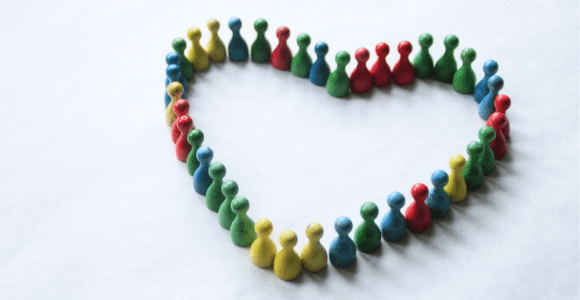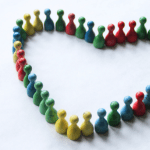Welcome readers! Please subscribe through the button on the right.
(Read this series from the beginning at Part 1 and Part 2.)

Giving Based on Need Rather than Worthiness
A more accurate translation for the next section of this week’s passage is “give to everyone who begs from you.” Consider the spirit of this injunction.
Jesus was trying to foster the kind of human community where we place people’s needs above our attachment to our own material possessions. In that community, when someone is in need, we don’t stop to ask if they are deserving. We simply give as we are able. Our actions aren’t to be about what kind of people others are but about what kind of people we want to be. If we have more than we need today, we should share with those whose needs are not met. We should do this, trusting that if at some point in the future our needs are not being met, the kind of reciprocal world we’ve created would be populated with people who can share with us from their surplus as we have shared from ours.
Demanding Return of Property
Some interpretations of this passage would forbid people who are disenfranchised or live in marginalized social locations from demanding justice, restitution, accountability, and reparations for harms committed against them.
But what could Luke’s Jesus have been referring to?
In our time, those who richly benefit from our predatory, exploitative, capitalist system often demand that their privilege, power and property be protected when others organize and call for justice. They’re the opposite of the priest in Victor Hugo’s Les Miserables who, when Jean Val Jean stole his silver and was caught by the police, gave Jean his candlestick, too. In the book A Black Theology of Liberation, James Cone wrote that those who were enslaved did not consider taking from the slave master’s possessions as theft or stealing as the slavocracy stole so much from them every day.
Our teaching says to those whose property and privilege have come at the expense of and harm of someone else: don’t demand it back when it’s ultimately taken from you.
Reciprocal Nature of Our World
This week’s passage also includes the universal golden rule found in most of the world’s religious traditions. It includes an unconditionally and universally compassionate description of the divine’s orientation to the ungrateful and wicked that harmonizes more with Christian universalism than with the Christian teaching of eternal torment. And Jesus calls on those who subscribe to unconditional, compassionate images of the divine to be those kinds of people in response: people of mercy and kindness without regard for the worth of recipients.
Lastly, the passage describes the reciprocal nature of judgment, of condemnation, of forgiveness, and of giving. Our choices show not only what kind of people we want to be; they also indicate what kind of community or society we are setting in motion with our choices.
“For with the measure you use, it will be measured to you.”
A dear friend of mine, Dr. Keisha McKenzie, often says, “Society is a group project.”
In school, I never much cared for group projects. I often felt that the weight of success was disproportionately pulled by those of us who cared about our work. That’s true in our society as well. But given the past two years, it especially behooves those of us who care to be more intentional. Group projects fall on the shoulders of those who care most, and what we choose to do, the kind of people we choose to collectively be, will contribute to the kind of world we bring into existence during our short time here.
I’m choosing the path of love: a path of distributive justice, of sharing, of caring. How about you?














